Bunny Reuben’s biography of Pran, as many Pran fans would know, is called …and Pran: A Biography, a nod to the hundreds of credit sequences in which Pran—invariably one of the most prominent artistes in whichever film he was in—was listed at the end of the credits. A nod, not just to the fact that his character was more often than not at odds with the hero and heroine and their parents/friends/well-wishers listed first in the credits, but also that Pran deserved to be credited separately. A sort of ‘leaving the best for the last’? I like to think so.
In this film, even though he plays the title role, it’s no different. And Pran as Halaku.
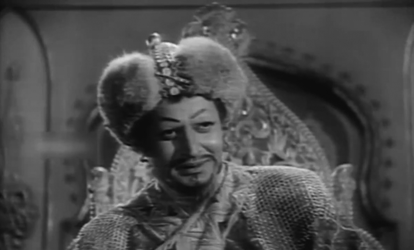 Halaku (or Halaku Khan, as he’s referred to), however, doesn’t put in an appearance till over half an hour into the film. The story, instead, begins with the romance of Parvez (Ajit) and Nilofer (Meena Kumari), who live in Persia and whose love story doesn’t seem destined to go anywhere because Nilofer’s father, Hakim Nadir, thoroughly disapproves of Parvez. Fortunately for Nilofer and Parvez, hakim sahib has to travel quite a bit to visit sundry patients. Behind his back, his daughter and her suitor spend their evenings in each other’s company.
Halaku (or Halaku Khan, as he’s referred to), however, doesn’t put in an appearance till over half an hour into the film. The story, instead, begins with the romance of Parvez (Ajit) and Nilofer (Meena Kumari), who live in Persia and whose love story doesn’t seem destined to go anywhere because Nilofer’s father, Hakim Nadir, thoroughly disapproves of Parvez. Fortunately for Nilofer and Parvez, hakim sahib has to travel quite a bit to visit sundry patients. Behind his back, his daughter and her suitor spend their evenings in each other’s company.
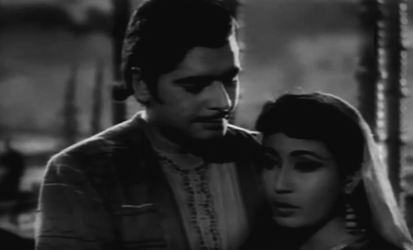
When he returns to his home town after a longish stint of travelling, hakim sahib is sitting at a qahwa khana with some friends, when he receives two disquieting pieces of news.
The first is that the fierce Mongol warrior Halaku Khan, grandson of the legendary Changez Khan, is poised to invade Persia. Everybody knows how Halaku has dealt with the occupants of other lands he’s invaded; things will not go well with Persia either.
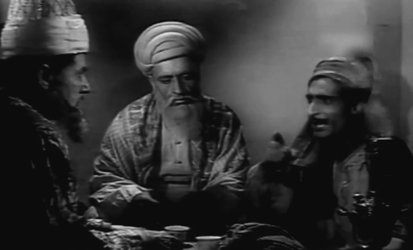
Hakim sahib is not particularly disturbed by this bit of news [Alas. He should be, he should be]. What worries him far more is the irate complaint of a passerby that Nilofer and her boyfriend Parvez have been horsing around, having pushed this poor fellow (the passerby) into a pond. The hakim is so angry, he hurries home to put Nilofer in her place and to stop her meeting Parvez once and for all…
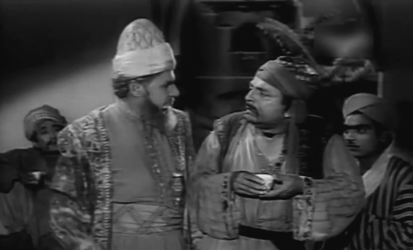
…thus preventing Nilofer from sticking to her rendezvous with Parvez that evening, and giving him the opportunity to sing a great song.
With hakim sahib yelling blue murder in the background, and Nilofer begging Parvez to formally ask Abba for his permission, and Parvez wishing Abba wasn’t quite as anti-Parvez as he is, this love story look like it’s not going anywhere. Fortunately for the young couple, Parvez’s servant Dilawar (Sunder) is on their side, and even dons a burqa and sends hakim sahib off on a wild goose chase after a fictitious patient—all to allow Nilofer and Parvez a little time together.
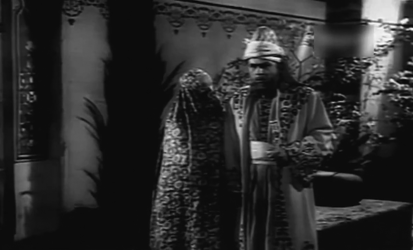
The end result being that Parvez is persuaded to try his luck with hakim sahib, which he does by approaching Hakim Nadir through a matchmaker. Hakim sahib throws the matchmaker out, telling him that he’d sooner see Nilofer dead than married to Parvez…
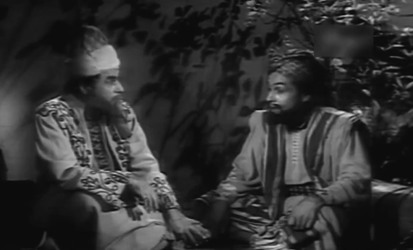
…and follows it up by visiting Parvez and letting him have his blessings. [Abba has a tough time making up his mind]. Parvez can’t quite believe his luck, but is very happy. Hakim sahib also tells him that the arrangements for the wedding can be made immediately, so Parvez mounts his horse and goes off to the city to buy wedding garments, jewellery, and other goodies for the celebration. The merchant, Qamaal (Raj Mehra) whom he goes to with his shopping list is a friendly soul, and congratulates Parvez on his upcoming wedding.
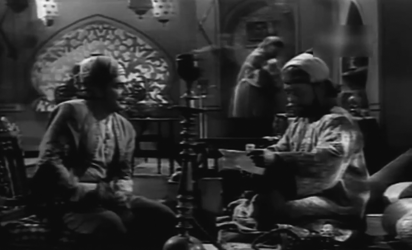
While Parvez is away doing his shopping, disaster strikes—in the form of Halaku and his rapacious armies. Before the Persians know it, the Mongols are rampaging through their towns, plundering and looting and killing as they go. Parvez, when he receives the news that the Mongols have attacked, rushes back home. And arrives in time to find his would-have-been-future father-in-law at his last gasp. Hakim Nadir’s house has been destroyed and looted (along with the rest of the town), and hakim sahib himself stays alive only long enough to beg for some water and pass on the ghastly news that Nilofer has been carried away by the Mongols.
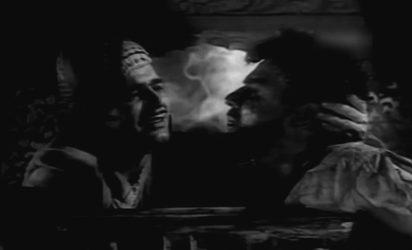
Nilofer isn’t the only Persian woman to have been taken captive; there are quite a lot of them, all tied up and sitting in a crowd in the Mongol encampment, while the Mongols amuse themselves by dancing, showing off their skills with sword and dagger, and so on. And Nilofer, instead of sitting quietly and keeping out of sight, leads the captive women in a mournful song—which of course draws the attention of the Mongols to her.
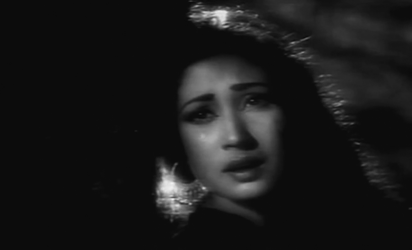
A shameful squabble breaks out between two of the Mongols regarding which of them has a right over her (one claims he saw her first, the other asserts his right as the killer of Hakim Nadir). Eventually, their boss gets so annoyed, that he decides to get rid of the root of the argument—by selling Nilofer off. So Nilofer is dragged off to the local marketplace and put on auction…

..where, thankfully, Parvez, hot on her trail, arrives in the nick of time and manages to get in a winning bid (for the massive sum of 5,000 dinars). Before he is called upon to pay up, however, Halaku’s own commander arrives, and Nilofer is once again dragged off. The man who’d been trying to sell her seems to have not had any right to do so; this girl, like the others, is Halaku’s property. Poor Parvez is lashed and left for dead when he tries to resist.
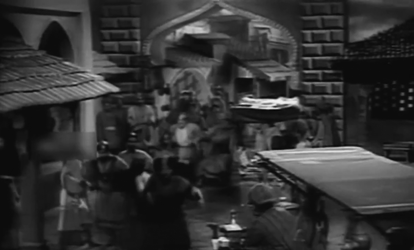
Nilofer, therefore, finds herself taken—along with a bunch of other girls—into Halaku’s presence. Halaku is dismissive; he has no use for these rather unimpressive girls (Nilofer is veiled, so he hasn’t seen her face yet). He orders a minion to take the girls away and give them to the Mongol commanders, to do with as they please.
Nilofer, unheeding of the danger she’s putting herself in, steps forward and protests. She argues that they’re not inanimate things, to be shuffled off from one person to another.
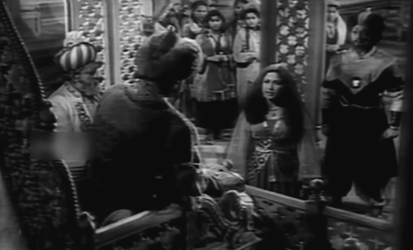
Halaku is too busy gaping at Nilofer—her veil’s come off, and he can see her in all her gorgeousness—to pay much attention to what she’s saying. All Nilofer manages to achieve is that Halaku gives his men orders to grab Nilofer and drag her off to his, Halaku’s palace.
Not, thankfully, so that he can immediately have his wicked way with her. Ruthless and bloodthirsty invader though he may be, Halaku does seem to have some scruples when it comes to forcing himself on women.
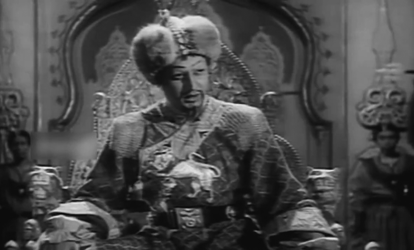
He, instead, has decided that Nilofer will not be merely a concubine, but his queen. This news, when broken into Nilofer, is met with distress, which Nilofer tries to hide by taking refuge in the excuse that all the recent turmoil—the plundering and looting of her town, the subsequent death of her father—has unhinged her. Halaku is, surprisingly, understanding, and leaves Nilofer to recover.
He even sends, as an attendant for Nilofer, a Persian girl (Shammi) named Naubahar. [Rather a stupid act on the part of Halaku, who should have known better. These Persian girls stick together]. Naubahar quickly becomes a confidant of Nilofer’s, and Nilofer tells her all—about her love for Parvez, and about how she needs to get free of Halaku.
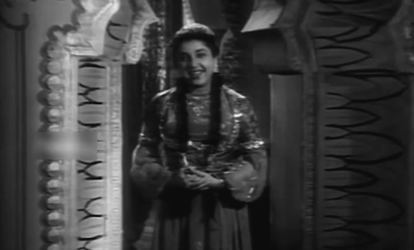
In the meantime, other things have been happening. For one, Halaku’s Christian queen [yes, he already has a queen], Dokuz (Veena) has come to know of her husband’s fascination for Nilofer, and tries to plead with him. Halaku gruffly reminds her that he is Mongol, and Mongols have always had harems. Poor Dokuz is reduced to spending all her time on her knees, praying that better sense will prevail.
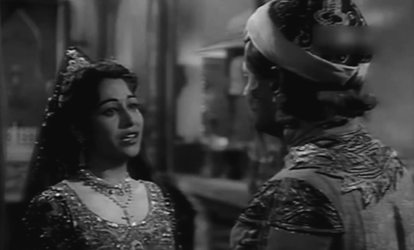
Outside the palace, Parvez—last seen being whipped and left for dead by the Mongols—has been revived and restored to health by the combined efforts of Qamaal and Dilawar. The three of them now begin to build up a Persian Resistance Movement, which consists in equal part of:
(a) men, trained in swordplay and other forms of fighting
(b) pretty dancers, equipped with goblets of poisoned wine [really an excuse to show off a good song-and-dance, featuring Helen and Minoo Mumtaz]
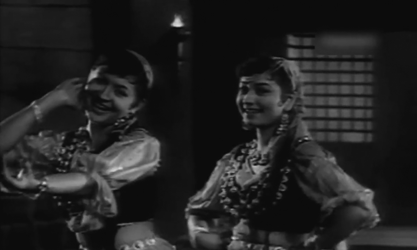
As it happens, Halaku has not been completely impervious to Dokuz’s many appeals to his better nature. She, along with Halaku’s wise and trusted adviser, Khwaja Sahib (Niranjan Sharma), has been urging Halaku on to look after the welfare of the Persians. And how is this to be achieved? By finding out what the Persians really want. [I have a sneaky feeling this should’ve been thought about before attacking Persia and destroying half the place].
And, in typical historical film style, the way of finding out what the populace actually want, is for the ruler to don a disguise and step out at night into town.
[It also, thankfully for us viewers, gives Pran one scene in which we see him with his own eyebrows].
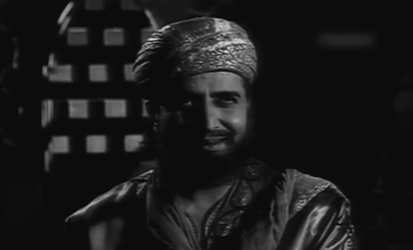
And Halaku, disguised as a Persian merchant, ends up watching the two Persian dancers—who’re in a rehearsal, poisoned wine in their goblets and all. Some high drama takes place (after all, the others think he’s Persian, so when he nearly drinks down a goblet of poisoned wine, they stop him just in time)—but, at the end of it all, Halaku is revealed to be the Mongol invader. This seems to be the Resistance’s chance to have their revenge, but Halaku has not come alone. His men are nearby, and it’s just a matter of time before Parvez is taken captive, and Halaku holds all the cards…
What I liked about this film:
Halaku is (and I wonder if that was intentional) quite reminiscent of another Hindi film, about the real Halaku’s grandfather, Changez Khan. In Changez Khan, too, the Mongol ruler was fascinated by a woman already in love with another man, and he seemed to be (as Halaku is) equally ready to do just about anything to make her his.
Where Halaku differs in is that Halaku is a less three-dimensional, less of an outright villain. For instance, there’s a scene shortly after Halaku arrives in Persia, when he’s ousted the former Sultan and has installed himself on the throne. Halaku’s minions bring him huge platters loaded with gold bars, which they’ve unearthed from the cellars of the palace. “Eat them!” Halaku orders the deposed Sultan, who, naturally, is puzzled. “Yes, eat them!” Halaku repeats. “That’s why you were collecting them, weren’t you? Because they would satisfy your hunger?!”
Even otherwise, while he is definitely cruel and imperious, Halaku does have a softer side to him. He is shown as a father and husband (and a husband, too, who listens to his wife’s wise counsel more frequently than he ignores it). And his treatment of Nilofer is not without mercy—for example, he does not force himself on her, even though there was little she could have done to prevent it. He’s a villain, but a villain with shades of grey, tempered by some quality of justice and honour.
The other good thing about Halaku is the music, by Shankar-Jaikishan. The soulful Aaja ke intezaar mein is probably the best-known of these, but there are other equally good ones: Aji chale aao and Dil ka na karna aitbaar koi are among my favourites.
What I didn’t like:
The melodrama is something I could’ve lived without, but I’ll have to be frank and admit that Halaku, compared to some other ‘historical’ Hindi films I’ve seen (Yahudi, Nausherwan-e-Adil, Aurat, etc) is rather low on the melodrama. It does go along quite faithfully with the true-love-is-persecuted-by-power trope of the films I’ve listed (and others, including Mughal-e-Azam and Changez Khan), but the villain here is a somewhat more sympathetic character than in most of the other films.
Would I recommend this one? If you like historicals, Pran, and good music, probably yes. (Meena Kumari, unfortunately, is not called upon to do much other than look pretty, sing a bit, and weep a lot. Veena, on the other hand, plays a surprisingly strong female character without being brutally imperious, as she was in Taj Mahal).
Little bit of trivia:
Halaku’s queen, Dokuz Khaatoon, was—as depicted in the film—actually a Christian (a Nestorian Christian, to be precise). She is also believed to have exercised a good deal of influence on Halaku. This interesting painting (courtesy Wikimedia), shows Halaku and Dokuz.

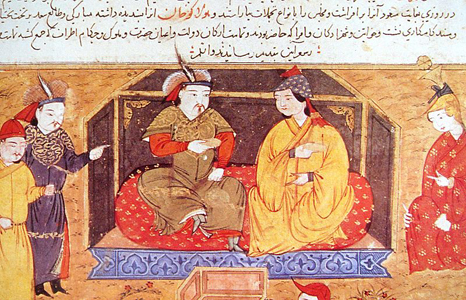
As Always a fantastic review and equally hilarious asides. especially loved this one :
Finding out what the Persians really want. [I have a sneaky feeling this should’ve been thought about before attacking Persia and destroying half the place]. Lol :)
LikeLike
Thank you! Glad you liked it. I suppose, since I do end up passing these comments while I’m watching a film, it’s but natural that I should end up putting them in my reviews as well. ;-)
LikeLike
:) I just watched Halaku. Nice to see your review; better still to read your asides. (S is busy doing pushups on the floor and wanted to know why I was giggling.) Pran was good in this, wasn’t he?
LikeLike
Pran was excellent in this. :-) Incidentally, I bought the VCD for this film because of Ajit, not Pran – I had seen Dholak a couple of years back, and simply loved Ajit in that, so I bought Halaku. And, while I thought Ajit was okay in it, the person who really impressed me was Pran. Much more the central character than Sheikh Mukhtar was in Changez Khan.
LikeLike
I absolutely agree with Anu, I too found myself chuckling as I was reading your review, it sure put me in a good mood (was feeling a bit low due to various reasons, one of them being mum’s anniversary is just a few days away). I like this one the most– And Nilofer, instead of sitting quietly and keeping out of sight, leads the captive women in a mournful song—which of course draws the attention of the Mongols to her.. I laughed out loud.
I have seen Halaku long, long ago on Doordarshan but do not remember anything but usually such films were okay, sort of what we call -time pass movie. Yes and that bit of trivia was quite interesting, I am a history buff remember?— Shilpi
LikeLike
Yes, it’s a decent enough time-pass movie. Fairly predictable, good songs, and an okay storyline. And, as far as I am concerned, the very fact that it is a historical is enough for me!
(Incidentally, when I first watched Halaku a couple of years back, searching on the net for the historical accuracy of Halaku yielded no results – I couldn’t even find any references on Wikipedia back then. Later, I read a book on Kublai Khan, which contained the Khan’s family tree – and there was Hulegu/Halaku!)
LikeLike
Great review, makes me want to see the movie, so here I go, adding one more movie to that interminably long list of mine – one of these days, surely! I liked the part where you said that “Nilofer, instead of sitting quietly and not draw attention to herself, leads the others in a mournful song, drawing the attention of the Mongols”! But then, where would Hindi movies be if they used their common sense? Besides, how else can she show off her koel si awaaz, courtesy Lataji?
LikeLike
So true, Lalitha! :-) If the heroine has been abducted, she must show off how beautifully she can sing sad songs. Otherwise how will one know? (By the way, even though I haven’t mentioned it in the post, there’s a zabardasti ka dance sequence also, where Halaku compels Nilofer to dance for him – another excuse, I think, to showcase both singing and dancing). Here it is:
LikeLike
Fabulous review, Madhu, as ever.
I just saw Munimji, and Pran was there too. There was this one song in which Dev and Nalini Jaywant force him to sing. He puts up such a comic performance there.
Luckily, we have so many films in which Pran’s talents are amply showcased. Thank God he chose to do character roles. We get to see him in so many avatars.
LikeLike
Thank you, Ava! :-)
He was good in Munimji, wasn’t he? And I agree he was funny in Dil ki umangein hain jawaan. By the way, if you get the time, do have a look at a comment N Venkataramanji has left on my tribute to Pran – he’s included several songs (all of which were new to me) showcasing Pran in a very varied set of roles. Including drag, and a double role.
LikeLike
:-D Enjoyed reading the review DO.
Like others I giggled at this one too;
>And Nilofer, instead of sitting quietly and keeping out of sight, leads the captive women in a mournful song—which of course draws the attention of the Mongols to her.
Another one;
> pretty dancers, equipped with goblets of poisoned wine brought visions of a painting depicting revolution, titled so (in line with “village belles filling water at well”) – it tickled my funny bone.
I’d enjoyed Nau-sherwan-e-adil. I must say good old Persia had an abundance of interesting material for films. Can’t remember if Yahudi took place there.
LikeLike
Thank you, pacifist! Glad you enjoyed the review. :-)
Yes, I liked Nausherwan-e-Adil too. I thought it was somewhat different from the usual historical (perhaps because of the setting – one doesn’t often come across pre-Islamic Persia in Hindi cinema).
IIRC, Yahudi was set in Rome and/or Judaea. I remember thinking, when I watched the film, that it had more than a passing resemblance to Quo Vadis.
LikeLike
Makes me want to see it!
though wonder if all of he were so noble, but the aim I think is not to present him as noble or not but to listne to the populace and be kind and all.
Was fun reading it!
LikeLike
Glad you liked it, Harvey! It’s a good time-pass film, as Shilpi says. And the music is very good.
I don’t think the objective was to portray Halaku as noble, but rather just human. He’s more shades of grey – for example, he has no qualms about attacking Persia or letting his soldiers pillage and plunder and kill. Yet, he’s not totally heartless, or going out of his way to make life miserable for people. So I’d say he was rather more believable than the usual Hindi film tyrant.
LikeLike
Nice review! Want to watch it for Ajit’s sake as he plays the protagonist here.And also for Pran and Meena Kumari! Ajit did play hero’s role in quite a few films…………………..
LikeLike
Yes, I always did like Ajit in his early films. I’ve seen a few of them, including this one, Dholak, Nastik, Tower House and Marine Drive. Even though he wasn’t the hero in them, I also liked his roles in Mughal-e-Azam and Naya Daur.
By the way, Halaku is available on Youtube, should you want to watch it there:
LikeLike
Thank you for providing the link :)
LikeLike
You’re welcome. :-) I hope you enjoy it!
LikeLike
Madhu, enjoyable and perceptive as always. This was a kind of breakthrough role for Pran, who got to play a central character. He certainly makes the most of it. By this time it was clear that Ajit, with his wooden delivery, was not going to worry Dilip, Raj and Dev too much. The music is outstanding, and for me the best song is dil ka na kar na aeitbaar koi. See the way Mohammed Rafi enters the song at the end of each stanza–It is a duet but not really a conventional one. S-J at the top of their game
LikeLike
Yes, I think Ajit was never quite in the same league as the others you mention. I mean, he was fine in films like Dholak (which is actually my favourite film of his), but otherwise, he’s probably memorable mostly in the supporting roles he’s played – like Naya Daur. Plus, of course, in the 70s, as a villain. :-)
Oh, yes. Dil ka na karna aitbaar koi is fabulous. Worth putting a link in here, to it:
LikeLike
Besides, Helen looks sensational
LikeLike
Agreed. I love her in a lot of these 50s songs.
LikeLike
Yes and Yes it was great history movie. Naturally many things have been revealed about Halakou and Mongols.
The summary is excellent. The robes, the dialogues and dances were excellent. Hallakou invaded Nishapur, where a well known Saint was living. Before Hallakue coming in lime light, Mangols have conquered large area. Then Mongol kingdom after the death of Odehe Khan between Qublai Khan and Hallakue Khan.
LikeLike